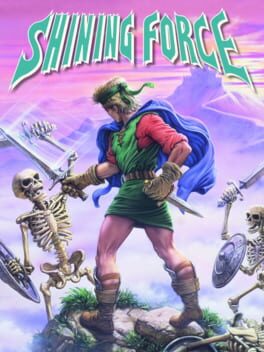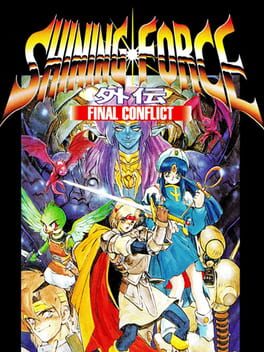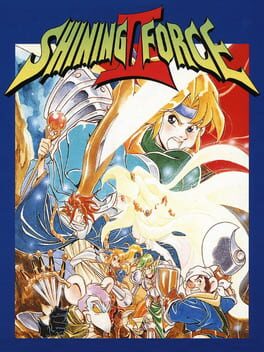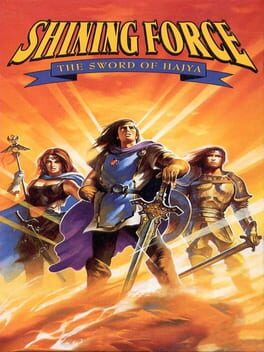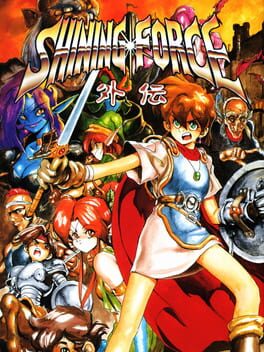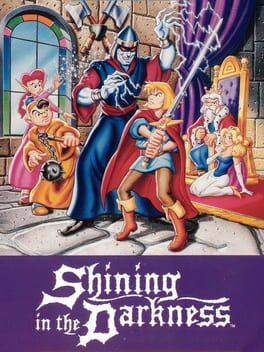

Shining Force is a turn-based tactical RPG. Battles take place in square grids, and each unit occupies 1 square. Units can belong to one of two sides: allies (controlled by the player) or enemies (controlled by the computer AI). Each unit can move up to a fixed amount of squares along the battlefield, determined by its Move statistic. Depending on its location relative to enemies and to allies, a unit also has the option to attack, cast a spell, use an item, search (if adjacent to a treasure chest), or stay and do nothing, all of which end the unit's turn. Some commands, such as equipping or dropping items, don't count as actions, and the character's turn is able to continue. The order of the turns is determined by the unit's agility score and a random seed. Units can use offensive actions, such as physical attacks or offensive magic, only on units belonging to the other side and can use supportive actions, such as healing magic, stat-enhancing magic, and items, only on units belonging to the same side.
Also in series
Released on
Genres
Reviews View More
You play as Max, a knight in training in the tiny kingdom of Guardiana, whose life is suddenly thrown into disarray when the evil kingdom of Runefaust invades. Runefaust seeks to unleash the ancient Dark Dragon and destroy the world, but it's up to Max and his team, the titular Shining Force, to put a stop to the Runefaust's evil machinations. The story is pretty straightforward for a fantasy story of the time, but it's remarkable in just how excellently its translated for 1993. A colorful world full of silly characters and fun quips (from a talking space-hamster to a bunch of centaurs to an armadillo man in a steam-mech suit) make the world of Rune a very memorable one.
The gameplay of Shining Force is a strategy RPG very much like Fire Emblem (a series also in its infancy at the time, as FE2 predates this game by only about a week), and reads very much like Sega's answer to Fire Emblem. Very much like Fire Emblem, you (effectively) have different classes of units composed to NPCs you recruit throughout the game, these units level up semi-randomly upon level-up, and they can equip weapons to make themselves stronger. Unlike Fire Emblem, Camelot decided to lean more into the RPG aspect of things rather than the strategy, having towns you can walk around and talk to NPCs in, mages that learn spells with levels rather than items, and simply buying items that have no durability, but there are also a lot of less than ideal consequences to that.
But first, let's start with some good and welcome innovations (or at the very least things I like) compared to Fire Emblem. First of all, there is no perma-death in Shining Force. If an ally goes down, they can be resurrected for super cheap back in town if you get a game over (i.e. your main character is taken out) or win the battle. There are also virtually no consequences for getting a game over, as you just get sent back to the last church you saved at but keep all of the items and experience you gained in your last encounter. Being able to level grind like this is a really cool feature in a game with semi-random level-ups and lots of characters (many of whom are admittedly not worth using). You also don't recruit characters in battle, and recruitment is always done in towns by just talking to people. Even level-ups have a really nice feature in that they have a built-in stabilizer for just how many bad level-ups you can get. If you're stuck with a few bad levels in a row, you're much more likely for the next one to give you BIG bonuses to get you to where the game thinks you "should" be at that particularly level. These are all really nice features that make the game, on a surface level at least, a very welcoming and forgiving experience compared to the (certainly at the time) far more brutal SRPG of Fire Emblem.
However, Camelot make a lot of baffling and (I would argue) bad choice in their further RPG-ifying of Fire Emblem's formula. First and foremost above all of them is how turn order is handled. The order each character goes in is determined by their respective speed stat combined with some hidden RNG, and this effectively means that you have no idea when a character's turn is coming. You can get an idea sometimes, if you're in a map with only a few enemies, but in larger maps, an enemy very well might get two turns and run forward to snipe your character before you had any meaningful chance to react. There are global turns limiting this (so they at least can't get like, three turns in a row), but with how hard many enemies hit and how hard the game can be at times, that's pretty cold comfort. This is made an even further problem by having no real way to tell how far an enemy can move, as while you can see their movement stats, you can't see how terrain affects it, so you can only hazard a guess at how safe you are from any given enemy. The game also lacks counterattacks of any kind (automatic or otherwise, at least so far as I experienced), so if you aren't getting in the first strike, you're getting the crap kicked out of you. And then on top of all THAT, the enemy AI is AWFUL, so it's a total crap shoot on if the enemy won't just stand there while you pummel their head in because something in their AI has bugged out so hard that they just don't know what to do.
The end result of all of this is that it's very, VERY difficult to meaningfully strategize in this "Strategy RPG", and it can lead to a lot of annoying game overs with your most valuable units getting sniped (robbing you of the DPS necessary to beat the many auto-healing bosses). A lot of them wouldn't even be THAT big of a problem if there were just turns like Fire Emblem (and so many other SRPGs) use. Thankfully, the fact that the penalty for dying is so minute and how you can grind whenever you want means that these aren't game-breaking problems. They're still big problems, and they make a lot of maps feel more like RNG chores to slog through rather than strategic puzzles to solve, but they keep the game from descending from "annoyingly bothersome" to "unforgivably mean-spirited".
Then on top of that there are some other problems that are more just things you can chalk up to the game's age and a lack of proper foresight in their design. Something that's sorta in between both of these spaces is how mages work. They level VERY slowly, and they have very low MP, so healing is a very limited resource compared to a lot of Fire Emblem games. It's not nearly as bad as Fire Emblem 1, where healers need to get attacked and survive to level up (because healing doesn't give them EXP), but it's still glacially slow compared to the rest of your party, and it makes those cheap shots earned by bad luck on the turn order feel that much worse and cheap.
Magic is also incredibly dangerous almost the entire game, as there is no way to defend against it with stats. Until you get to higher HP values (which some characters simply never do), you're almost always one or two magic attacks away from being killed, no matter how high your defense stat may be. In one last move that I consider well-meaning but ultimately not very good, things such as double attacks, evasion, and critical hit chance are all linked to hidden, fixed values for each character and monster type, so you never know just how much danger you're going to be in (unlike a Fire Emblem where you generally have a speed or luck stat that determines when those things will happen). None of them are outright game breaking, sure, but it all contributes to that "this is a slog I need to get lucky to win at" feeling that plagues a lot of the game.
The presentation is quite good. It's a Mega Drive game from 1992, and it's a damn nice looking one at that. Character portraits are pretty, as are the environments. The monster designs are also very cool, bringing that "fantasy meets ancient high technology" aesthetic that the Shining series is known for to full bore through very pretty attack animations. The music is also very good, and makes the slogging times much more bearable when they happen.
Verdict: Hesitantly Recommended. Given the two points that the localization is so good AND Fire Emblem wouldn't be localized for roughly a decade, it is not that surprising to me how Shining Force captured so many hearts and minds back in the day and continues to be a fondly remembered game now. But in 2021, I think the game has aged very roughly with just how poorly the strategy elements are executed. This is a game you'll likely find charming in its presentation and not utterly impossible in its difficulty, but if you're more used to more polished strategy game or SRPGs, then you're likely going to have a quite boring if not frustrating time seeing Shining Force through to the end.
Another really long game, but I still thoroughly enjoyed my time with it. Shining Force is a Tactical RPG where you control multiple hero units as if you are playing Chess to clear out all enemies on the field or at least until you cleared out their leader. I've never really played any games of that genre, not even Fire Emblem, but I have tapped into Shining Force several years ago and never seen a game quite like it. It felt bizarre, but I found it captivating.
The premise is a classic light vs darkness where you must stop Darksol, who if you recall, is the main villain of Shining in the Darkness... well, at least that's what localizers made you believe. The thing is, the Darksol of this game is the original Darksol and the one in Shining in the Darkness, Dark Sol, was actually his son named Mephisto. The game's premise is very similar to Shining in the Darkness, but unlike that game where much of its story is just... there, there is actually more effort into making the story engaging as there is much more dialogue across the game with many towns to visit and villains to confront. I would at least say that out of the stories in the Sega Genesis line-up from the 52 games that I've played so far, it's probably my favorite although that bar has been very low.
The cast of characters are quite vast although many of them are pretty one-note as they don't really contribute much else to the game's plot. The villains do stand out with their corruption, evil, and just being a menace like how Mishaela burned your boat and forced you to go find another. However, I think my annoyance with them is that they have a habit of confronting you on the battlefield and rather than ensure your demise they are just... "I'll let the minions deal with you!" and run off. I understand we're not strong enough to beat them at the early stage of the game, but it just feels oddly convenient. Of course, there are supposedly an array of other problems that come with the story, some of which you'll have to come up with your own explanation, and others feel rather convenient. The most bizarre of which is the Prompt plotline where the civilians start out as complete morons which is presumably an act they put on, the king throws you in prison because he thinks you're a spy, then some random breaks you out, and now all of a sudden he and the entire civilization grows a brain probably bigger than all of Rune. Even the children there are schooling the teachers, and even though the game acknowledges it, I don't know what the fuck happened. To be fair, the game does take a more comedic approach when visiting towns and talking to civilians. I think one of the highlights was when you can turn yourself into a chicken and everyone just reacts to you differently. It's not even required to progress the plot, and it's incredibly pointless, but it's just so comical that I can't help love it. Another one of my favorite moments is at Shade Abbey where it's not as funny as it is bizarre and downright creepy. Like I genuinely thought the game was bugged when I was wandering around.
As far as the playable characters go, there are 30 of them in the game and it's very unlikely you'll use them all on your first playthrough. In fact, I didn't even get a chance to use Domingo, Lyle, Torasu, Jogurt, or Adam throughout the game. But who are they all and what do they do?
Starting with the Hero, Max. He is the protagonist of the game and mandatory for all teams because he is the character you control in the overworld. On the surface, he might just seem another lowly knight compared to the centaurs that mock him in the beginning of the game. However, he does have his own tricks up his sleeves. Other than being one of the strongest characters in the game as far as stats go, he has the power to use Egress which is a spell that can allow you to retreat battle when needed. If you find yourself in a bad situation or just need to grind levels by forcing the foes to reset, this is what you should cast and since your mana and health fully recovers in the overworld, it's practically free to use as long as it's his turn. But here's another interesting quirk that he has. The enemies are all going to want him dead no matter what. Since Max is the leader of the Shining Force, if he dies, then you'll be forced to retreat to the overworld and restart the battle all over again. This can make it rather intimidating to try to use him in fights. However, you can actually work this to your advantage as you can force the enemies to bend over backwards trying to kill Max and put yourself at a huge advantage, and if you got some healers on your side, you can just have them spam heals on him while he takes damage.
The healers of the game include Lowe, Gong, Khris, and Torasu. Lowe is your starter healer who's main advantage is learning stronger healing spells earlier with more mana which makes him more consistent as well as a stronger Quick and Slow, but trying to level him up is a major pain and he does not have any AoE healing. Gong's advantage is that he hits the hardest and takes the most damage, but should probably be treated as more of an off-healer since his mana is lower than the others. Khris has the advantage of using Aura before you get Torusu, but trying to level her up is really challenging and her Quick and Slow is not as strong as Lowe's although she learns hers earlier than he does. Torusu's advantage is being able to use Aura 4 which is a heal that applies to everyone on the board, but as far as I can tell, his single-target healing is the worst in the game.
The knights in this game are quite a lot and they are all centaurs. There's Ken, Mae, Arthur, Pelle, Vankar, and Earnest. Ken and Vankar have the advantage of being high in HP which makes them more suited to taking on magic foes since the damage they deal is set. Mae, Earnest, and Pelle have the advantage of being high in defense which makes them ideal in the face of more physical foes. Then there's Arthur who is statistically the weakest of all the knights, but he has the ability to use magic which does sound promising until you realize it's all Level 1 which sounds like it falls off even late-game. Probably one of the worst characters in the game.
The wizards consist of Tao, Anri, Alef, and Domingo. Each of which are categorized by their strongest elemental. Tao has the strongest Blaze in the game which is not as strong as Freeze or Bolt, and this could mean she falls off late game. However, she does have the advantage of being able to boost an allies physical attack which would make her the premiere mage choice in a more physical orientated team. She also has Dispel which I had no idea what that did until I looked it up and it says it mitigates spells which might've been more useful than I would've thought. Anri has the advantage of being able to use both Level 2 Bolt and Level 2 Flame as well as Level 4 Freeze, and even though Bolt 4 is stronger, it still holds up really well even at the final boss and since you get Anri much earlier, she is way more accessible. Unforunately, her Muddle spell never really works for me. From what I read, it confuses the foe which may cause them to miss or hit themselves, but I can never get it to land. Alef is a hard one since she comes late game, but the reward is having the strongest spell in the game in the form of Bolt 4. She also gets Desoul which is a OHKO attack, but it has very low accuracy and just not worth trying your luck. There's also Domingo who I ended up missing because I had no idea you were supposed to get his egg where you recruit both Anri and Arthur. However, he is arguably the strongest mage in the game as he learns Freeze 4, and he can actually fly.
The archers in the game include Hans, Diane, and Lyle. As far as I'm aware, the only distinction is their level curve. Hans starts out weak, but can outmatch Diane who has a more stable learning curve that lets her outmatch Hans, but does fall off. Lyle, from what I've heard, has more attack compared to the two, but lower agility which means the turn order. Also, because he is a centaur, he moves remarkably slow in forest battles compared to Hans and Diane who could freely move about.
The dwarves are similar to the centaurs being melee fighters as they are Warriors, but they have the advantage of not having movement hindered in mountain battles. Those two include Luke and Gort. Luke apparently starts out stronger than Gort, but because Gort comes in earlier, there's a good chance that he won't be on your team much longer.
A unit that can ignore all terrian and be able to bypass even walls that can normally not be crossed are fliers. Other than Domingo, there's also Balbaroy and Amon which are both Birdman as well as Kokichi who is easy to miss. These three are very valuable for their ability to fly although once you get Bleu, one of the top three best units in the game, they really fall off.
Other than Bleu, who can fly and deal impressive damage. We have Zylo and Guntz who don't fall under any traditional classes, but they are ground units that can take impressive amount of damage, deal damage right back, and even ignore terrain. Zylo is undeniably powerful and arguably a must-have, but Guntz is rather odd because he starts out really slow and at first, you might think there's no reason to be leveling him because his fat ass takes too many turns to get to where everyone else can get in just 1 turn. Well, just wait until you give him a promotion, the movement ring, and the Valkyre and he suddenly becomes a powerful force of nature overnight.
So this leaves us with Adam, Musashi, and Hanzou (Also Jogurt, but he's literally designed to be a troll pick). Musashi is really strong, but he's very secretive and unavailable for promotion. If you know where to look, you could have a powerful samurai on your hands that grows strong in the late-game. Both Adam and Hanzou come really late into the game, and while they can be strong under the right circumstances, given how slow the battle system is (unless you decide to use fast forward feature), grinding them out is a serious pain. In Hanzou's case, in particular, the units actually get a lot more difficult because the chimera and the dragon units keep dodging which makes it harder to grind out experience, so I decided it wasn't worth trying.
In case you want to know what my final team was. It was Maximus, Tao, Gong, Gort, Khris, Anri, Diane, Zylo, Guntz, Bleu, Alef, and Musashi.
Each unit has their own set of classes and progression, and can grow in power via promotion. It is recommended to level them to Level 20 before giving them a promotion since they gain a better base stat total since their level resets to 1, and even allow them to grow stronger faster because the game will think there's a huge level difference between you and the foe, and you will just level up like crazy.
And I say you'll need it because the foes do get really difficult, especially during the final five battles where they bring out the chimeras and the dragons, and because flying enemies tend to dodge attacks better, they will just be a pain to hit unless you are using magic which will never miss. Also, they will use magic and even have a chance to double strike using magic which will chunk your HP. It's a massive difficultly spike, and you'll need to brace yourself. On the bright side, the final boss was a highlight and a visual spectacle.
Overall, I had a good time with the game. It's a long game that you will be using fast forward and rewind just to help you with grinding and getting through with slower parts of the game, so don't expect another playthrough from me for a long time. Maybe when I next play the game in 8 or 10 years from now, I'll use the romhack that nerfs the battlefield size.
